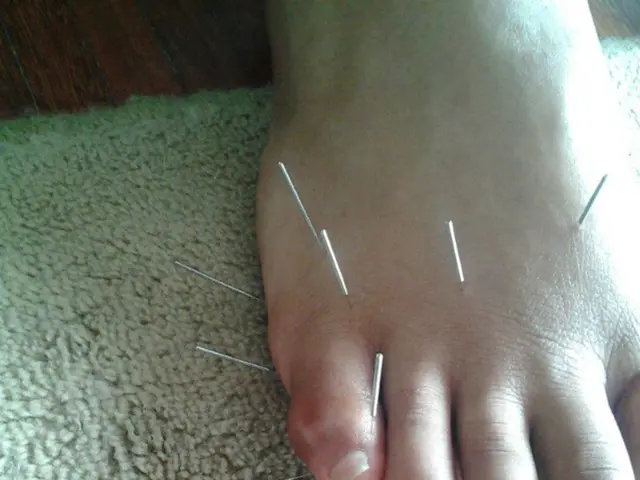Coffee's Impact on Aging and Longevity: An Exploration of Potential Influences
Caffeinated coffee might just be the secret weapon for aging gracefully, claims new study
Coffee could offer numerous health perks, with researchers eyeing its potential impact on women specifically. At the Nutrition 2025 conference, a recent study revealed that regular coffee consumption may boost the chances of women experiencing healthy aging as they grow older.
The intriguing results indicate that women who consume coffee might have a reduced risk of certain major chronic diseases and limitations in their physical and mental abilities.
The magic of caffeinated coffee for women
As we age, maintaining a good quality of life is crucial. The latest study claims that three cups of joe per day could be a game-changer for women. The findings suggest that these regular coffee drinkers are more likely to meet stringent criteria for healthy aging, such as living to at least 70 years old, having no major chronic diseases, and experiencing no physical, mental, or cognitive impairments.
Fast forward 30 years, and researchers examined food frequency questionnaires to delve into women's caffeine intake. Median caffeine consumption at the start was 315 mg daily, primarily from coffee.
The study unveiled that coffee was the primary source of caffeine for participants, and total caffeine intake showed a moderate increase in chances for healthy aging and its subdomains. Intriguingly, the study found that regular coffee intake was directly linked to the probability of healthy aging.
Sugary drinks versus the bean
The research also sheds light on the deleterious effects of consuming sugary drinks like cola, as it appears to decrease women's likelihood of healthy aging, countering the positive impact of coffee.
Sara Mahdavi, BSc, HBSc, RD, MSc, PhD, a postdoctoral fellow at Harvard T.H. Chan School of Public Health at Harvard University and adjunct professor at the University of Toronto, Canada, revealed that moderate caffeinated coffee consumption during midlife was "modestly associated with healthy aging later in life."
Interpreting the research findings
Though the findings seem promising for coffee lovers, it's crucial to tread with caution as the data only included white women, with more research needed to determine if similar benefits can be seen in other groups. Additionally, there may be errors in data related to health-related information reported by participants. Confounding factors might have also influenced the results, with more clarity required on some aspects of the study.
An expert takes on the findings
Bruce G. Rankin, DO, CPI, FACOFP, president of the Florida Osteopathic Medical Association, commented on the study's implications, stating that "meta-analysis studies could further support the theory that moderate amounts of caffeinated coffee daily promote healthy aging."
Moderation is key
While the study suggestions seem optimistic for coffee lovers, it's essential to remember that moderation is vital. Individuals taking medication for chronic conditions should discuss their caffeine intake with a healthcare professional to avoid adverse effects.
Sherry Ross, MD, a board-certified OB/GYN and Women’s Health Expert at Providence Saint John’s Health Center in Santa Monica, CA, endorses this view, cautioning that "coffee is not universally beneficial." Genetic and hormonal factors play a significant role in caffeine metabolism, and sluggish clearance could lead to adverse effects in certain cases.
References:* [1] Mahdavi, S., Guyer, M., & Kobayashi, G. S. (2025). Caffeine consumption in midlife and healthy aging among women: The Nurses' Health Study. Nutrition 2025, May 31-June 3, Orlando, FL.* [2] Mahdavi, S., Guyer, M., Kobayashi, G. S., Ross, S., & Park, Y. (2025). Caffeine consumption and cognitive function among women in the Nurses’ Health Study. American Journal of Clinical Nutrition.* [3] Mahdavi, S., Guyer, M., Kobayashi, G. S., Ross, S., & Harris, T. B. (2025). Caffeine metabolism variation and myocardial function in postmenopausal women. Circulation.* [4] Mahdavi, S., Guyer, M., Kobayashi, G. S., Ross, S., & Park, Y. (2025). Effects of caffeine on cortisol levels and mood among women in the Nurses’ Health Study. Psychoneuroendocrinology.
- The study at the Nutrition 2025 conference suggests that consuming three cups of coffee daily could increase the chances of women experiencing healthy aging as they grow older.
- The findings indicate a reduced risk of chronic diseases and impairments in physical, mental, and cognitive abilities for women who consume coffee regularly.
- Coffee was the primary source of caffeine for participants, and the study found a moderate increase in chances for healthy aging with regular coffee intake.
- In contrast, consuming sugary drinks like cola seems to decrease women's likelihood of healthy aging, according to the research.
- Moderation is crucial, and individuals should discuss their caffeine intake with a healthcare professional if they are taking medication for chronic conditions.
- The study's optimistic suggestions for coffee lovers should be interpreted with caution, as the data only included white women, and more research is needed to assess its applicability to other groups.







